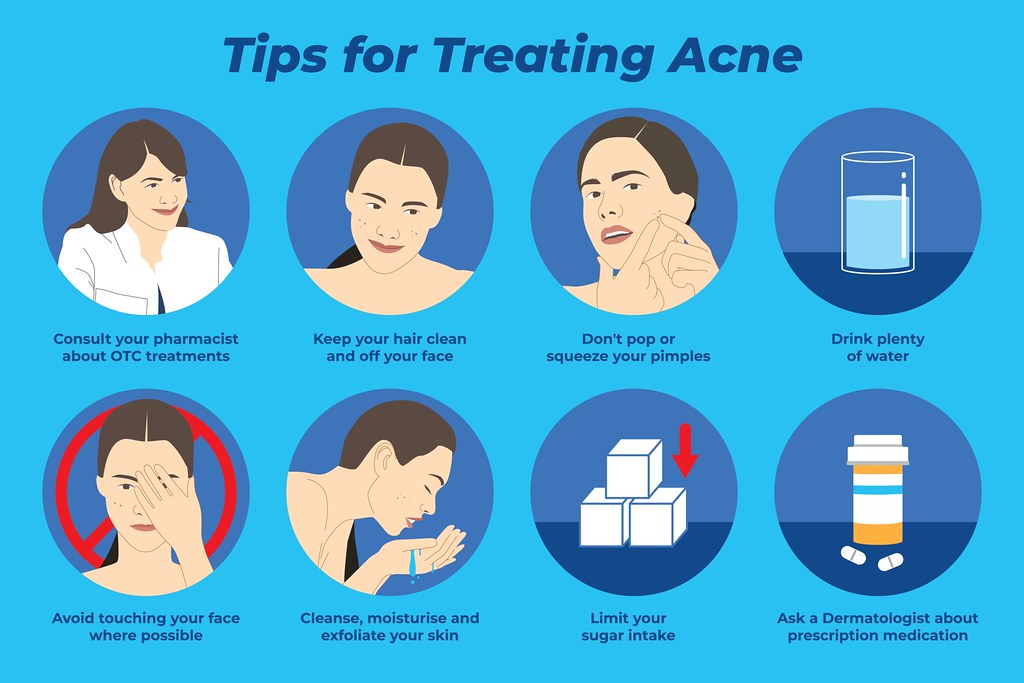
ACNE
ACNE
Acne is the most common skin condition problem among many people. It generally starts at puberty, but it can affect people at different stages of their lives. Acne is an inflammatory skin disorder that occurs when tiny holes in the skin, known as hair follicles, become clogged with oil and dead skin cells, or bacteria, leading to pimples, whiteheads, blackheads, painful bumps and other blemishes.
The tiny sebaceous glands near the surface of your skin are attached to hair follicles, which are small holes in your skin from where an individual hair grows out of. It appears most often on the face and neck, but can also appear on the back, chest and shoulders.
The most common area on the face is especially on the forehead, nose, and chin. On the Back, many people experience acne, especially on the shoulders and upper back. Acne can also appear on the chest, often due to sweating or wearing tight clothing. The neck is another area that can be affected, especially for people who wear necklaces or scarves.
The symptoms of acne are Pimples, Blackheads, whiteheads, inflamed patches or red patches and inflammation around the affected area on the skin, Zits, Cysts or nodules (painful or deep bumps).
Most of the time, hormonal changes, usage of oily cosmetics and hair products and unhealthy eating habits cause acne.
The main causes of developing acne are:-
- Hormonal changes: Hormonal changes lead to Puberty, menstruation, pregnancy, or other hormonal shifts that can increase oil production. Hormonal changes involve genetic issues as well; if there is a family history, it tends to develop acne.
- Excess oil production: Overactive sebaceous (oil) glands contribute to clogged pores. Dead skin cells and oil can block hair follicles, which leads to the problem of acne.
- Usage of oily cosmetics: You should always use products according to your skin type, consulting your dermatologist, as many times oily cosmetics take no time to develop acne and make it to even worse condition of the skin.
- Clogged pores: Bacteria: Propionibacterium acne bacteria can thrive in clogged pores, leading to inflammation.
- Diet and lifestyle: Unhealthy eating habits may contribute to acne, although this is still debated.
Most of the time, Acne is usually not a serious health hazard, as it tends to go away by time, with proper cleansing of your skin and good eating habits. Acne can be superficial or deep. However, severe acne can cause cysts and nodules to form under the skin and can result in permanent scarring.
Acne can be categorised in three forms as follows:-
- Mild acne: Occasional pimples or blackheads.
- Moderate acne: More frequent pimples, blackheads, and possibly some cystic acne.
- Severe acne: Persistent breakouts with cysts, scarring, and deep inflammation that may need medical intervention.
Doctors may prescribe antibiotics, stronger retinoids, or hormonal treatments based on the severity of the acne condition and history. Generally, it can be done in the following ways:-
- Oral medications: For severe cases, oral antibiotics may be prescribed.
- Lifestyle changes: A Proper skincare routine, stress management, and using non-comedogenic products can help.
- Professional treatments: Laser therapy, chemical peels, or extraction procedures by a dermatologist.
- Topical treatments: Over-the-counter (OTC) creams and gels containing ingredients like benzoyl peroxide, salicylic acid, or retinoids.
Treatments containing benzoyl peroxide can reduce the bacteria that cause acne. Salicylic or glycolic acid products can remove the dead skin cells that lead to acne. Our hospital offers an acne cleanser that contains both acids to clean the skin and reduce breakouts.
Recommended effective products for managing acne are summarised as:-
- Cleansers: Gel or foam-based cleansers with salicylic acid or benzoyl peroxide. Regular cleansing, twice a day, is ideal for removing those layers of old oil, dirt and makeup.
- Spot treatments: Concentrated treatments with benzoyl peroxide or sulfur for individual pimples.
- Moisturizers: Oil-free or non-comedogenic moisturizers to keep skin hydrated without clogging pores.
- Sunscreen: Oil-free, broad-spectrum sunscreens are essential, as some acne medications can increase sun sensitivity.
Healthy eating habits indeed play an important role in keeping your skin healthy, it's like what you eat matters a lot. While diet’s role in acne is debated, certain foods may contribute:
- Dairy products: Some studies suggest dairy, especially milk, may aggravate acne.
- High-glycemic foods: Refined carbohydrates and sugary foods (like white bread, pasta, and sweets) may increase insulin levels and inflammation.
- Greasy or fried foods: These can lead to oilier skin, though their direct link to acne isn’t fully proven.
Some foods that cause acne should be avoided in general from regular eating habits. They can be briefed as follows:-
1. Processed Foods, 2. Dairy Products, 3. Refined Sugar, 4. Caffeine, 5. Trans Fats, 6. Alcohol, 7. Refined Carbohydrates, 8. Soy Products, 9. Artificial Sweeteners, 10. Foods High in iodine, 11. Soda drinks and 12. Junk foods are the main cause of acne.
Everyone’s skin is different, and what works for one person may not work for another. Some creams help unclog pores, are anti-inflammation treatments and exfoliate the skin. Early treatment can prevent acne scars and help in reducing them further. Consult your dermatologist for a better solution.


